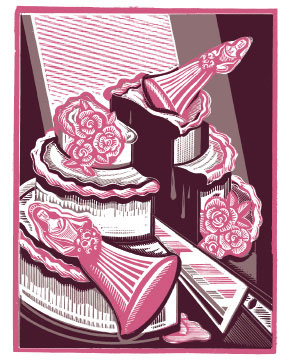The Cassandras of religious liberty were back in full cry last week after a Colorado appeals court upheld a judge’s decision not to let baker David Phillips refuse to bake a cake for Charlie Craig and David Mullins, who wanted one to celebrate their marriage.
“The court’s ruling against Phillips is a carnival funhouse of bias, where legal doctrine after legal doctrine is distorted and twisted to make sure that Phillips is forced to comply with the latest mandates of the sexual revolution,” wrote David French over at National Review. Whew!
Just so everyone’s clear, here’s how the situation arose:
In July 2012, Craig and Mullins visited Masterpiece, a bakery in Lakewood, Colorado, and requested that Phillips design and create a cake to celebrate their same-sex wedding. Phillips declined, telling them that he does not create wedding cakes for same-sex weddings because of his religious beliefs, but advising Craig and Mullins that he would be happy to make and sell them any other baked goods. Craig and Mullins promptly left Masterpiece without discussing with Phillips any details of their wedding cake.
Craig and Mullins sued under the Colorado Anti-Discrimination Act, which bars discrimination on grounds of sexual orientation in a place of public accommodation. Determining that the act was a neutral law of general applicability (the standard of review under the U.S. Supreme Court’s Smith decision), the court found in their favor.
This seems like a solid basis for the decision to me, but let’s forget about the legalities and focus for a moment on the larger principle of religious liberty. Shouldn’t a society that has enshrined that principle be able to accept Baker Phillips’ refusal to engage in a commercial transaction that would violate his religious convictions?
Crucial to answering that question is accepting the corollary principle that such a society does not get to decide that certain religious convictions are valid and others aren’t. If we are to recognize the right of a person with one sincerely held belief to act on it in a certain way, we have to recognize the right of a person with another sincerely held belief to act on it in exactly the same way.
So here’s a simple quiz for anyone opposed to the latest mandate of the sexual revolution. Substitute “mixed-race” for “same-sex” in any given set of particulars, as in:
In July 2012, Craig and Mullins visited Masterpiece, a bakery in Lakewood, Colorado, and requested that Phillips design and create a cake to celebrate their mixed-race wedding. Phillips declined, telling them that he does not create wedding cakes for mixed-race weddings because of his religious beliefs, but advising Craig and Mullins that he would be happy to make and sell them any other baked goods. Craig and Mullins promptly left Masterpiece without discussing with Phillips any details of their wedding cake.
Should Colorado defer to the principle of religious liberty in this case and permit an exception to its anti-discrimination act? If not, why not?






